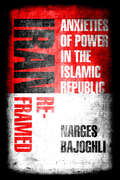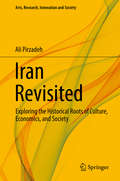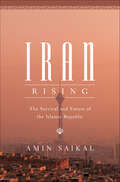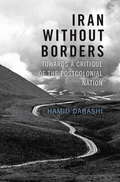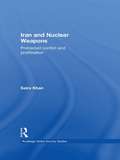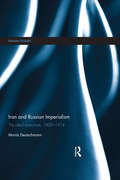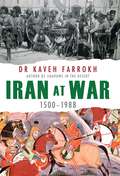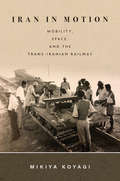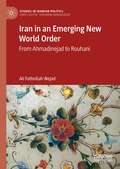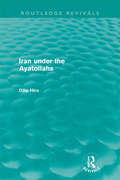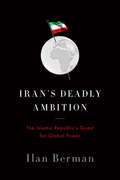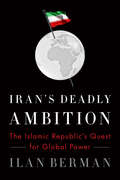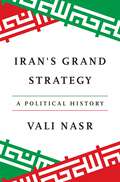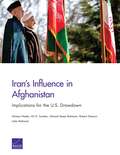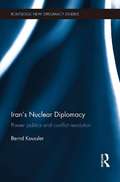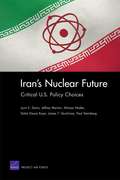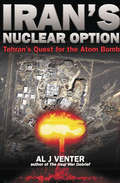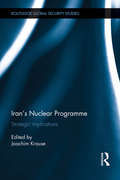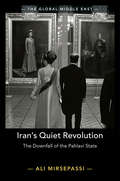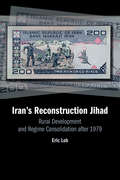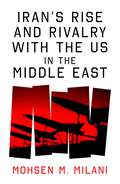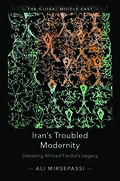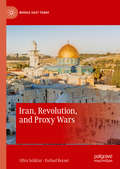- Table View
- List View
Iran Reframed: Anxieties of Power in the Islamic Republic (Stanford Studies in Middle Eastern and Islamic Societies and Cultures)
by Narges BajoghliAn inside look at what it means to be pro-regime in Iran, and the debates around the future of the Islamic Republic. More than half of Iran's citizens were not alive at the time of the 1979 Revolution. Now entering its fifth decade in power, the Iranian regime faces the paradox of any successful revolution: how to transmit the commitments of its political project to the next generation. New media ventures supported by the Islamic Republic attempt to win the hearts and minds of younger Iranians. Yet members of this new generation—whether dissidents or fundamentalists—are increasingly skeptical of these efforts. Iran Reframed offers unprecedented access to those who wield power in Iran as they debate and define the future of the Republic. Over ten years, Narges Bajoghli met with men in Iran's Revolutionary Guard, Ansar Hezbollah, and Basij paramilitary organizations to investigate how their media producers developed strategies to court Iranian youth. Readers come to know these men—what the regime means to them and their anxieties about the future of their revolutionary project. Contestation over how to define the regime underlies all their efforts to communicate with the public. This book offers a multilayered story about what it means to be pro-regime in the Islamic Republic, challenging everything we think we know about Iran and revolution.
Iran Revisited
by Ali PirzadehThis book examines Modern Iran through an interdisciplinary analysis of its cultural norms, history and institutional environment. The goal is to underline strengths and weaknesses of Iranian society as a whole, and to illustrate less prescriptive explanations for the way Iran is seen through a lens of persistent collective conduct rather than erratic historical occurrences. Throughout its history, Iran has been subject to many studies, all of which have diagnosed the country's problem and prescribed solutions based on certain theoretical grounds. This book intends to look inward, seeking cultural explanations for Iran's perpetual inability to improve its society. The theme in this book is based on the eloquent words of Nasir Khusrau, a great Iranian poet: "az mast ki bar mast". The words are from a poem describing a self-adoring eagle that sees its life abruptly ended by an arrow winged with its own feathers--the bird is doomed by its own vanity. The closest interpretation of this idiom in Western Christian culture is "you reap what you sow", which conveys a similar message that underlines one's responsibility in the sense that, sooner or later, we must face the choices we make. This would enable us to confront - and live up to - what Iran's history and culture have taught us.
Iran Rising: The Survival and Future of the Islamic Republic
by Amin SaikalAn authoritative account of how and why the Islamic Republic has survived to become a critical player in the Middle East and the worldWhen Iranians overthrew their monarchy, rejecting a pro-Western shah in favor of an Islamic regime, many observers predicted that revolutionary turmoil would paralyze the country for decades to come. Yet forty years after the 1978–79 revolution, Iran has emerged as a critical player in the Middle East and the wider world, as demonstrated in part by the 2015 international nuclear agreement. In Iran Rising, renowned Iran specialist Amin Saikal describes how the country has managed to survive despite ongoing domestic struggles, Western sanctions, and countless other serious challenges.Saikal explores Iran’s recent history, beginning with the revolution, which set in motion a number of developments, including war with Iraq, precarious relations with Arab neighbors, and hostilities with Israel and the United States. He highlights the regime’s agility as it navigated a complex relationship with Afghanistan during the Soviet invasion, survived the Gulf wars, and handled fallout from the Iraqi and Syrian crises. Such success, Saikal maintains, stems from a distinctive political order, comprising both a supreme Islamic leader and an elected president and national assembly, which can fuse religious and nationalist assertiveness with pragmatic policy actions at home and abroad.But Iran’s accomplishments, including its nuclear development and ability to fight ISIS, have cost its people, who are desperately pressuring the ruling clerics for economic and social reforms—changes that might in turn influence the country’s foreign policy. Amid heightened global anxiety over alliances, terrorism, and nuclear threats, Iran Rising offers essential reading for understanding a country that, more than ever, is a force to watch.
Iran Under the Pahlavi Monarchy: Essays in Iranian History, Politics, Culture and Literature (Iranian Studies)
by Homa KatouzianBringing together eighteen essays from Homa Katouzian, this book explores Iranian history, politics, culture and Persian literature from mediaeval times through the nineteenth century and into the contemporary period.Beginning with an overview of mediaeval Iranian history, the book then considers developments in the nineteenth century leading to the Constitutional Revolution of 1906-1911, which resulted in the fall of the Qajar dynasty (1785-1925). This is followed by a comprehensive overview of the Pahlavi monarchy (1925-1979) and a new and original analysis of the Iranian Revolution of February 1979. The book also includes essays on modern and classical Persian literature, encompassing Persian poetry and politics (1919-1925), the hitherto unstudied humour in Sadeq Hedayat’s life and works, a critical study of Forugh Farrokhzad, a study of Persian literary devices with special reference to the great Persian classic Sa‘di, and a study of Sa‘di as a lover of beauty and advocate of human morality.The book analyses Iran in a way that has seldom been done in one single volume – the history of the Qajar and Pahlavi dynasties, the two great revolutions in the twentieth century, and the unfamiliar nature of state and society in Iranian history, as well as some of the high points in modern and classical Persian literature – and is vital reading for anyone interested in the Middle East.
Iran Without Borders: Towards a Critique of the Postcolonial Nation
by Hamid DabashiA history of the cosmopolitan forces that made contemporary Iran "No ruling regime," writes Hamid Dabashi, "could ever have a total claim over the idea of Iran as a nation, a people." For decades, the narrative about Iran has been dominated by a false binary, in which the traditional ruling Islamist regime is counterposed to a modern population of educated, secular urbanites. However, Iran has for many centuries been a nation forged from a diverse mix of influences, most of them non-sectarian and cosmopolitan. In Iran Without Borders, the acclaimed cultural critic and scholar of Iranian history Hamid Dabashi traces the evolution of this worldly culture from the eighteenth century to the present day, journeying through social and intellectual movements, and the lives of writers, artists and public intellectuals who articulated the idea of Iran on a transnational public sphere. Many left their homeland--either physically or emotionally--and imagined it from places as far-flung as Istanbul, Cairo, Calcutta, Paris, or New York, but together they forged a nation as worldly as it is multifarious.From the Hardcover edition.
Iran and Nuclear Weapons: Protracted Conflict and Proliferation (Routledge Global Security Studies)
by Saira KhanThis book investigates what is driving Iran's nuclear weapons programme in a less-hostile regional environment, using a theory of protracted conflicts to explicate proliferation. Iran’s nuclear weapons program has alarmed the international community since the 1990s, but has come to the forefront of international security concerns since 2000. This book argues that Iran’s hostility with the United States remains the major causal factor for its proliferation activities. With the US administration pursuing aggressive foreign policies towards Iran since 2000, the latter’s security threat intensified. A society that is split on many important domestic issues remained united on the issue of nuclear weapons acquisition after the US war in Iraq. Consequently, Iran became determined in its drive to acquire nuclear weapons and boldly announced its decision to enrich uranium, leaving the US in no doubt about its nuclear status. This book underscores the importance of protracted conflicts in proliferation decisions, and underpinning this is the assumption that non-proliferation may be achieved through the termination of intractable conflicts. The aims of this work are to demonstrate that a state’s decision to acquire nuclear weapons depends largely on its engagement in protracted conflicts, which shows not only that the presence of nuclear rivals intensifies the nuclear ambition, but also that non-nuclear status of rival states can promote non-proliferation incentives in conflicting states inclined to proliferate. This study will be of great interest to students of Iran, Middle Eastern politics, nuclear proliferation and international relations theory. Saira Khan is a Research Associate in the McGill-University of Montreal Joint Research Group in International Security (REGIS).
Iran and Russian Imperialism: The Ideal Anarchists, 1800-1914 (Iranian Studies)
by Moritz DeutschmannRather than a centralized state, Iran in the nineteenth century was a delicate balance between tribal groups, urban merchant communities, religious elites, and an autocratic monarchy. While Russia gained an increasingly dominant political role in Iran over the course of this century, Russian influence was often challenged by banditry on the roads, riots in the cities, and the seeming arbitrariness of the Shah. Iran and Russian Imperialism develops a comprehensive picture of Russia’s historical entanglements with one of its most important neighbours in Asia. It recounts how the Russian Empire strived to gain political influence at the Persian court, promote Russian trade, and secure the enormous southern borders of the empire. Using hitherto often neglected documents from archives in Russia and Georgia and reading them against the grain, this book reveals the complex reactions of different groups in Iranian society to Russian imperialism. As it turns out, the Iranians were, in the words of the Russian orientalist Konstantin Smirnov, "ideal anarchists," whose resistance to imperial domination, as well as to centralized state institutions more generally, impacted developments in the region in the century to come. Iran’s troubled relationship with the wider world continues to be a topic of considerable interest to historians, yet little focus has been given to Russia’s historical connections to Iran. This book thus represents a valuable contribution to Iranian and Russian History, as well as International Relations.
Iran at War: 1500-1988
by Kaveh FarrokhIran's complex, violent military history encompasses two world wars, foreign intervention, anti-government revolts, border disputes, a revolution, a war against Iraq that lasted over eight years, and its desperate quest to become a nuclear power. Following his award-winning book, Shadows in the Desert, which explored the military history of ancient Persia, in Iran at War Kaveh Farrokh turns his attention to modern Iran's wartime history. Beginning with the Safavid dynasty of the 16th and 17th centuries, he traces Iran's political and military progress to its dramatic turning point in 1979. In doing so, Farrokh demonstrates how Iran's current bellicosity on the world stage was shaped by centuries of military defeat and humiliating foreign influences from the likes of Russia and Great Britain. Including illustrations and photographs, this book provides an unparalleled investigation into the bloody history of modern Iran.
Iran in Motion: Mobility, Space, and the Trans-Iranian Railway
by Mikiya KoyagiCompleted in 1938, the Trans-Iranian Railway connected Tehran to Iran's two major bodies of water: the Caspian Sea in the north and the Persian Gulf in the south. Iran's first national railway, it produced and disrupted various kinds of movement—voluntary and forced, intended and unintended, on different scales and in different directions—among Iranian diplomats, tribesmen, migrant laborers, technocrats, railway workers, tourists and pilgrims, as well as European imperial officials alike. Iran in Motion tells the hitherto unexplored stories of these individuals as they experienced new levels of mobility. Drawing on newspapers, industry publications, travelogues, and memoirs, as well as American, British, Danish, and Iranian archival materials, Mikiya Koyagi traces contested imaginations and practices of mobility from the conception of a trans-Iranian railway project during the nineteenth-century global transport revolution to its early years of operation on the eve of Iran's oil nationalization movement in the 1950s. Weaving together various individual experiences, this book considers how the infrastructural megaproject reoriented the flows of people and goods. In so doing, the railway project simultaneously brought the provinces closer to Tehran and pulled them away from it, thereby constantly reshaping local, national, and transnational experiences of space among mobile individuals.
Iran in an Emerging New World Order: From Ahmadinejad to Rouhani (Studies in Iranian Politics)
by Ali Fathollah-NejadThis book critically develops and discusses Iran’s geopolitical imaginations and explores its various foreign-policy schools of thought and their controversies. In doing so, the book covers Iran's foreign policy and international relations from "9/11" all the way to Rouhani’s rise (late 2014). Accounting for both domestic and the international balance of power, the book theorizes the post-unipolar world order of the 2000s, dubbed “imperial interpolarity”, examines Iran’s relations with non-Western great-powers in that era, and offers a critique of the “Rouhani doctrine” and its economic and foreign-policy visions.Forged in the fires and intense deliberations of a PhD, undertaken at a most unique institution of higher learning in the world, Ali Fathollah-Nejad has produced one of the most informative and evocative studies of Iran’s foreign policy and international relations to date. Framed in a highly original theoretical approach, Ali’s nuanced analysis, drawing on a lorry load of primary and secondary sources, details the process and context of policy in the Islamic Republic, thus producing an unrivalled and lasting account of modern Iran’s worldview and the behaviour of this revolutionary state in a fast-changing world.—Anoush Ehteshami, Professor of International Relations & Director of the Institute for Middle Eastern and Islamic Studies, School of Government and International Affairs, Durham University (UK)Empirically rich and theoretically sophisticated, Iran in an Emerging New World Order flashes out the key drivers behind Iran’s international relations since the mid-2000s. Providing evidence for the material and geopolitical significance of Iran’s identity constructions, the book enriches the debate on the Islamic Republic’s foreign policy and bridges the divide between the discipline of IR and area studies.—Fawaz A. Gerges, Professor of International Relations & inaugural Director, LSE Middle East Centre (2010–13), London School of Economics and Political Science (LSE); author of the forthcoming The 100 Years' War for Control of the Middle East (Princeton University Press, 2021).Ali Fathollah-Nejad has established himself as one of the most insightful observers of Iranian politics. Providing the analytical background to his assessments of Tehran’s foreign policy in the 21st century, this book comes out opportunely at a time when a new U.S. administration is about to re-engage with Iran.—Gilbert Achcar, Professor of Development Studies and International Relations, SOAS (School of Oriental and African Studies) University of LondonA decisive contribution to two avant-gardist fields of knowledge: Critical geopolitics and Iranian foreign relations. Anyone interested in cutting-edge research that brings together International Relations and Iranian Studies will revel in this important book.—Arshin Adib-Moghaddam, Professor in Global Thought and Comparative Philosophies, Department of Politics and International Studies & former Chair (2012–18), Centre for Iranian Studies, SOAS University of LondonOne of the few to have a thorough, beyond-the-headlines and forward-looking grasp of Iran, Ali Fathollah-Nejad offers a brilliant analysis of what is in store for Iran. A must-read for anybody interested in geopolitics.—Florence Gaub, Deputy Director & Director of Research, European Union Institute for Security Studies (EUISS), ParisIt is no longer possible to think of any nation-state without simultaneously seeing the reflection of an entire changing world in it. Ali Fathollah-Nejad’s prose and politics in Iran in an Emerging New World Order is the state-of-the-art mapping of the epistemic shift that seeks to understand the global in the local, and the domestic in the foreign. The result is a mode of supple and symbiotic thinking that reveals the way transnational politics dwells on the borderline where the fate of nations unravels into the fold of a dysfunctional diso
Iran under the Ayatollahs (Routledge Revivals)
by Dilip HiroFirst published in 1985, this is a comprehensive study of the Middle East's most strategic country, set against the background of the Islamic heritage of Iran and the rise and fall of the Pahlavi dynasty. Dilip Hiro describes the various phases through which the Islamic revolution has passed, gives an incisive account of the first Gulf War, and provides an historical survey of Iran's relations with the West, the Soviet bloc, and other countries of the region.
Iran's Deadly Ambition
by Ilan BermanAre we on the cusp of détente with Iran? Conventional wisdom certainly seems to believe so. In the aftermath of the interim nuclear deal struck in November 2013 between the Islamic Republic and the P5+1 powers (the United States, France, England, Russia, China and Germany), hopes are now running high for a historic reconciliation between Iran's clerical regime and the West. Yet there is ample reason for skepticism that the United States and Europe can truly curb Iran’s nuclear ambitions by diplomatic means. Moreover, the current focus on Iran’s nuclear program not he part of the Western governments is deeply dangerous, because it fails to recognize--let alone address--Iran’s other international activities, or its foreign policy ambitions. Those objectives reveals Ilan Berman, are global in scope, and they are growing. Iran's Deadly Ambition explains how America's retraction from the Middle East has created significant breathing room for an Iranian regime that not long ago was on the political ropes. Economically, the Islamic Republic is "out of the box" that was erected over the past decade-and-a-half by Western sanctions, thanks to the "interim" nuclear deal. As a result, Iran's leaders are again thinking big about their country and its place in the world. America faces stark choices: to confront Iran's nuclear ambitions andglobal activities, or to accept and accommodate the region's newest hegemon, with all that that portends for American security and the safety of its allies.
Iran's Deadly Ambition: The Islamic Republic's Quest for Global Power
by Ilan BermanAre we on the cusp of détente with Iran? Conventional wisdom certainly seems to believe so. Since the start of diplomacy between the Islamic Republic and the P5+1 powers (the United States, France, England, Russia, China, Germany) in November 2013, hopes have been running high for a historic reconciliation of Iran's clerical regime with the West.Yet there is ample reason for skepticism that the United States and its allies can truly curb Iran's nuclear ambitions by diplomatic means. Moreover, the West's current focus on Iran's nuclear program is deeply dangerous insofar as it fails to recognize-let alone address-Iran's other international activities or its foreign policy aims. Those objectives are global, and they continue to grow in scope and menace.In this sobering book, Ilan Berman illuminates the multiple dimensions of the Iranian threat and exposes the perils of lodging confidence in diplomacy with the Islamic Republic.
Iran's Grand Strategy: A Political History
by Vali NasrFrom the New York Times bestselling author of The Shia RevivalA gripping account that overturns simplistic portrayals of Iran as a theocratic pariah state, revealing how its strategic moves on the world stage are driven by two pervasive threats—external aggression and internal dissolutionIran presents one of the most significant foreign policy challenges for America and the West, yet very little is known about what the country&’s goals really are. Vali Nasr examines Iran&’s political history in new ways to explain its actions and ambitions on the world stage, showing how, behind the veneer of theocracy and Islamic ideology, today&’s Iran is pursuing a grand strategy aimed at securing the country internally and asserting its place in the region and the world.Drawing on memoirs, oral histories, and original in-depth interviews with Iranian decision makers, Nasr brings to light facts and events in Iran&’s political history that have been overlooked until now. He traces the roots of Iran&’s strategic outlook to its experiences over the past four decades of war with Iraq in the 1980s and the subsequent American containment of Iran, invasion of Iraq in 2003, and posture toward Iran thereafter. Nasr reveals how these experiences have shaped a geopolitical outlook driven by pervasive fear of America and its plans for the Middle East.Challenging the notion that Iran&’s foreign policy simply reflects its revolutionary values or theocratic government, Iran&’s Grand Strategy provides invaluable new insights into what Iran wants and why, explaining the country&’s resistance to the United States, its nuclear ambitions, and its pursuit of influence and proxies across the Middle East.
Iran's Influence in Afghanistan: Implications for the U.S. Drawdown
by Robert Stewart Alireza Nader Ali G. Scotten Ahmad Idrees Rahmani Leila MahnadThis study explores Iranian influence in Afghanistan and the implications for the United States after most U. S. forces depart Afghanistan in 2016. Iran has substantial economic, political, cultural, and religious leverage in Afghanistan. Although Iran will attempt to shape a post-2014 Afghanistan, Iran and the United States share core interests: to prevent the country from again becoming dominated by the Taliban and a safe haven for al Qaeda.
Iran's Nuclear Diplomacy: Power politics and conflict resolution (Routledge New Diplomacy Studies)
by Bernd KausslerThis book examines the dynamics of relations and the substance of the negotiations between the international community and Iran over the latter's nuclear programme. Iran’s nuclear programme and the alleged threat to international peace and security remains one of the most important issues in the United States, as well as in European foreign affairs. In the US, Iran has dominated the political discourse for over three decades and Europe has spent considerable political capital in finding a diplomatic solution to Iran’s nuclear ambitions. While relations between both states remain subject to mutual hostility, the EU remains a channel of communication and since 2003 has maintained a multilateral negotiation framework. By and large, the narrative on nuclear negotiations is dominated by constructivist and realist literature, portraying relations between the US and Iran in ideological terms as a prolonged struggle for regional influence. Embedded within conflict resolution and diplomatic theory, this work attempts to bridge this gap. Drawing upon primary documents and interviews, the text examines negotiation behaviour, and strategies and tools of statecraft, as well as analysing technical aspects of initiatives concerning the nuclear programme. This book will be of much interest to students of nuclear proliferation, international diplomacy, Middle Eastern politics, security studies and IR in general.
Iran's Nuclear Future: Critical U.S. Policy Choices
by Lynn E. Davis Alireza Nader Dalia Dassa Kaye Jeffrey Martini James T. QuinlivanAs Iran's nuclear program evolves, U.S. decisionmakers will confront a series of critical policy choices involving complex considerations and policy trade-offs. These policy choices could involve dissuading Iran from developing nuclear weapons; deterring Iran from using its nuclear weapons, if it were to acquire them; and reassuring U.S. regional partners. The U.S. Air Force will need to prepare to carry out whatever policies are chosen.
Iran's Nuclear Option: Tehran's Quest for the Atom Bomb
by Al J. Venter“The most systematic exposition to date about Iran’s nuclear program and its role in world affairs” (Middle East Quarterly).Since the Islamic Republic of Iran admitted that it was secretly producing highly enriched, weapons-grade uranium, nations have struggled to react appropriately. For the first time, and in full detail, this book explains exactly what the Europeans and United Nations have been trying to forestall.Iran could shortly have the ability to strike its immediate Middle Eastern neighbors—and more distant nations—with nuclear weapons. With the size to dominate its region, Iran also has an avowed mission to export its theocratic principles, and in recent decades, has been a notorious supporter of terrorist organizations. Its parallel development of atomic bombs represents the greatest threat to the balance of world power we’ve seen in the new millennium.Here, defense expert Al Venter reveals the extent to which Iran’s weapons program has developed and the clandestine manner in which its nuclear technology has been acquired. He demonstrates how Tehran has violated the Nuclear Non-Proliferation Treaty and details the involvement of several countries shown by the IAEA to have trafficked in illegal nuclear materials. He proves, for the first time, a direct link between the now-defunct South African apartheid regime’s nuclear program and Tehran’s current nuclear ambitions.Venter digs deep into subjects such as Iran’s fervor on behalf of Shiite Islam, its missile program—developed alongside its nuclear one—and the role of the Pasdaran, the Revolutionary Guards, whose tentacles have spread throughout the Middle East and increasingly farther afield. While noting Tehran’s support of terrorist groups such as Hezbollah, Venter follows closely how the Persian homeland itself has progressed toward a strategic nuclear capability that would make recent terrorist attacks look obsolete. Iran’s Nuclear Option is essential reading for anyone with an interest in global security, the perilous volatility of the Middle East, and America’s options, should it be willing and able to counter the threat while time remains.
Iran's Nuclear Programme: Strategic Implications (Routledge Global Security Studies)
by Joachim KrauseThis book examines the strategic implications of Iran’s nuclear programme, providing an inventory of the negotiations and a discussion of possible solutions to this pressing international security issue. The Islamic Republic of Iran’s nuclear programme has been the cause of one of the most extended international crises of the past decade. Multilateral institutions have been unable to resolve the issue, which has the potential to derail the global nuclear non-proliferation regime. Recent failures of diplomatic offers for an extended Iran-EU cooperation and projected US arms sales to Iran’s neighbours suggest an imminent escalation of the issue, which has been simmering since first reports about Iranian nuclear fuel-enrichment activities emerged in 2002. Since then, the topic has been the subject of intense media coverage as well as academic and diplomatic debate. This volume brings together analysts and authors with diverse backgrounds, including international diplomats formerly involved in negotiations with Iranian officials. The various chapters bring together different perspectives and empirical analyses, and include detailed assessments of both US and European efforts in diplomatic relations with Iran, as well as of the domestic politics in Iran itself. This book will be of interest to students of Iranian politics, Middle Eastern politics, strategic studies, nuclear proliferation, international security, foreign policy and IR in general.
Iran's Political Economy since the Revolution
by Suzanne MaloneyOver three decades after the Iranian Revolution reconfigured the strategic landscape in the Middle East, scholars are still trying to decipher its aftereffects. Suzanne Maloney provides the first comprehensive overview of Iran's political economy since the 1979 revolution and offers detailed examinations of two aspects of the Iranian economy of direct interest to scholars and non-specialist readers of Iran: the energy sector and the role of sanctions. Based on the author's research as both a scholar and government advisor, the book also features interviews with American and Iranian government officials. Moving chronologically from the early years under Khomeini, through the economic deprivations of the 1980s during the Iran-Iraq war, through liberalization under Khatami to the present, Maloney offers fascinating insights into Iran's domestic politics and how economic policies have affected ideology, leadership priorities, and foreign relations.
Iran's Quiet Revolution: The Downfall of the Pahlavi State (The Global Middle East #9)
by Ali MirsepassiOffering a new perspective on Iran's politics and culture in the 1960s and 1970s, Ali Mirsepassi challenges the prevailing view of pre-Revolution Iran, documenting how the cultural elites of the Pahlavi State promoted a series of striking 'Gharbzadegi' or 'Westoxification' discourses. Intended as ideological alternatives to modern and Western-inspired cultural attitudes, these influenced Persian identity politics, and projected Iranian modernity as a 'mistaken modernity' despite the regime's own ferocious modernisation programme. Focusing on the cultural transformations which defined the period, Mirsepassi sheds new light on the Pahlavi State as an ideological gambler, inadvertently empowering its fundamentalist enemies and spreading a 'quiet revolution' through secular and religious civil society. Proposing a new theoretical framework for understanding the anti-modern discourses of Ahmad Fardid, Jalal Al-e Ahmad, and Ali Shari'ati, Iran's Quiet Revolution is a radical re-interpretation of twentieth century Iranian political history which makes sense of these events within the creative, yet tragic Iranian nation-making experience.
Iran's Reconstruction Jihad: Rural Development and Regime Consolidation after 1979
by Eric S. LobBased on over one hundred and thirty interviews with government officials, revolutionary activists, war veterans, and development experts, this is the first full length study in English to examine the significant yet understudied organization and ministry, Reconstruction Jihad, as a basis for understanding the political and social changes and continuities that have transpired in the Islamic Republic of Iran (IRI) over the last four decades. Exploring the success of the Iranian revolution, the state's development policies, its overall resilience and the conflicting dynamics of its attempts to mobilize and institutionalize activists, Iran's Reconstruction Jihad is one of the few studies that adopts an institutionalist approach toward analyzing critical aspects of the IRI's history and politics, with comparative implications for analyzing revolutionary processes and outcomes across other geographic regions and time periods.
Iran's Rise and Rivalry with the US in the Middle East
by Mohsen M. MilaniThe 1979 Islamic Revolution triggered a cold war between Iran and the United States – former fast friends. Despite the US&’s relentless efforts at containment, Iran has risen as a formidable power in Iraq, Syria, Lebanon, Yemen, and Gaza. Its newfound status not only frustrates the US but has swiftly become a thorn in the side of Israel and Saudi Arabia. How did Iran rise so rapidly? And as it faces ever increasing pressure at home and abroad, can it hold onto its power? Mohsen Milani guides us through the twists and turns of the Iran–US rivalry in the battlefields of the Middle East. Going from the fall of the Shah to revolutionary Iran&’s alliances with Syria, Hamas, Hezbollah, Iraqi militias, and the Houthis in the Axis of Resistance, Milani lifts the veil on Iran&’s foreign policy strategy and its implications for the region, the US and Iran itself.
Iran's Troubled Modernity: Debating Ahmad Fardid's Legacy (The Global Middle East #5)
by Ali MirsepassiAhmad Fardid (1910–94), the 'anti-Western' philosopher known to many as the Iranian Heidegger, became the self-proclaimed philosophical spokesperson for the Islamic Republic, famously coining the term 'Westoxification'. Using new materials about Fardid's intellectual biography and interviews with thirteen individuals, Ali Mirsepassi pieces together the striking story of Fardid's life and intellectual legacy. Each interview in turn sheds light on Iran's twentieth-century intellectual and political self-construction and highlights Fardid's important role and influence in the creation of Iranian modernity. The Fardid phenomenon was unique to the Iranian story, and yet contributed to a broader twentieth-century Heideggerian tradition that marked the political destiny of other countries under a similar ideological sway. Through these accounts, Mirsepassi cuts to the nerve of how deadly political 'authenticity movements' take hold of modern societies and spread their ideology. Combining a sociological framework with the realities of lived experience, he examines Iran's recent and astonishing upheavals, experiments, and mass mobilizations.
Iran, Revolution, and Proxy Wars (Middle East Today)
by Ofira Seliktar Farhad RezaeiThis book analyzes the historical quest of the Islamic Republic of Iran to export its revolution to the Muslim countries in the Middle East and beyond. The authors argue that Iran exported its revolution by using proxies such as Hezbollah, the Iraqi Shite militias, and the Houthis. The study unravels the casual chain behind less-known cases of Iranian sponsorship of al Qaeda (Central) and al Qaida in Iraq. It combines rigorous theory with detailed empirical analysis which can add to the current debate about ways to roll back Iran’s revolutionary export.
